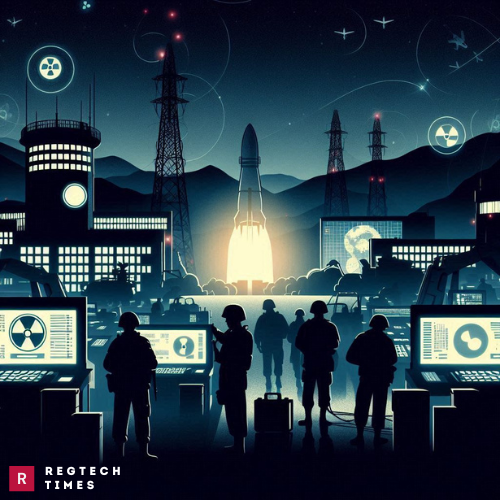North Korea is once again at the center of global concerns, with South Korea’s National Intelligence Service (NIS) reporting that the isolated nation may carry out its seventh nuclear test after the upcoming U.S. presidential election in November. This comes as tensions remain high in the region, with North Korea continuing to expand its nuclear and missile capabilities despite facing international sanctions.
The NIS, South Korea’s primary spy agency, made this critical assessment during a briefing to the country’s parliamentary intelligence committee. Lawmakers were updated on Pyongyang’s possible plans and the growing threat posed by its nuclear stockpile. This news, reported by Yonhap News Agency and later cited by News.Az, sheds light on North Korea’s domestic and international strategies.
The Timing: Why Conduct a Nuclear Test After the U.S. Election?
North Korea’s timing for its next nuclear test seems strategically aimed at the U.S. presidential election. Historically, North Korea has used key global political events to advance its agenda and provoke responses from world powers. The upcoming U.S. election presents another opportunity for Pyongyang to make a calculated move that could influence U.S. foreign policy.
By conducting a nuclear test after the election, North Korea could force the incoming U.S. administration to prioritize diplomatic or security efforts concerning its regime. Whether through a show of power or an attempt to reset diplomatic relations, North Korea likely views the U.S. election as a pivotal moment in shaping its future interactions with Washington.
According to Rep. Lee Seong-kweun of South Korea’s ruling People Power Party, the NIS believes that North Korea’s actions are “externally conscious” of the U.S. election. This timing suggests that Pyongyang is looking to strengthen its hand as it prepares to negotiate with whichever candidate assumes office in Washington. A nuclear test would be a clear signal that North Korea is still a significant player on the global stage.
Powerful Sanctions Strike: U.S. Targets Russia and North Korea’s Secret Dealings
North Korea’s Expanding Nuclear Capabilities
Central to these developments is North Korea’s rapidly advancing nuclear program. The NIS estimates that Pyongyang possesses around 70 kilograms of plutonium, along with significant amounts of highly enriched uranium (HEU)—enough to produce a double-digit number of nuclear weapons. This capability makes the potential nuclear test even more concerning for global security.
In early September, North Korean state media publicly revealed information about the country’s uranium enrichment facilities for the first time. Kim Jong-un’s visit to one such facility was broadcast widely, signaling North Korea’s intent to continue enhancing its nuclear capabilities. While the specific location and date of Kim’s visit remain undisclosed, the event highlights North Korea’s desire to flaunt its nuclear advancements, possibly as a prelude to a future nuclear test.
This public disclosure serves two key purposes. On the international front, it is a warning to the U.S. and its allies that North Korea remains undeterred in its nuclear ambitions. Domestically, it could help bolster the regime’s image amid ongoing economic difficulties. By showcasing its nuclear strength, North Korea’s leadership may be trying to reassure its population of the regime’s stability despite the country’s mounting economic crises.
Domestic Struggles and Economic Hardships
While external pressures often dominate discussions surrounding North Korea, the regime also faces significant internal challenges. Years of international sanctions, natural disasters, and the long-term effects of the COVID-19 pandemic have severely crippled the country’s economy. Food shortages and other humanitarian crises have worsened, leaving Kim Jong-un’s regime under immense domestic strain.
Nuclear Deal Renewal: Iran’s Intentions Ahead of UN General Assembly
A potential nuclear test could also serve as a distraction from these internal issues. By directing attention to North Korea’s military and nuclear capabilities, the regime can divert public focus from the deteriorating economic conditions. Rep. Park Sun-won of South Korea’s opposition Democratic Party highlighted this, noting that the nuclear test plans appear to be aimed at “boosting confidence among the population amid the extremely dire economic situation.”
Global Implications of North Korea’s Nuclear Test
A new nuclear test would undoubtedly have significant implications for international diplomacy and security. Previous efforts to engage North Korea diplomatically, including the high-profile summits between Kim Jong-un and former U.S. President Donald Trump, have failed to produce lasting results. North Korea has continued to develop its nuclear arsenal, posing an ever-greater threat to its regional neighbors, including South Korea and Japan, as well as the broader global community.
The U.S., along with its allies, will closely monitor North Korea’s actions, especially as the presidential election approaches. The next U.S. administration, whether led by an incumbent or a new leader, will face the challenge of deciding whether to pursue renewed diplomacy with Pyongyang or implement a more stringent policy of sanctions and deterrence.
China and Russia, two of North Korea’s key international allies, will also play crucial roles in shaping the international response to a potential nuclear test. Their reactions could influence the geopolitical landscape and determine whether North Korea faces further isolation or continued support from these powerful nations.
As North Korea signals its readiness for another nuclear test, the global community is reminded of the ongoing challenges posed by its unpredictable regime. With a growing stockpile of nuclear materials and the strategic timing of its provocations around the U.S. election, North Korea is positioning itself to gain maximum leverage on the international stage.
The international community must find a way to address North Korea’s nuclear ambitions while considering its internal pressures. A renewed nuclear test would have far-reaching consequences, shaping the security landscape in East Asia and beyond. Whether through diplomacy, deterrence, or a combination of both, the world must prepare for the implications of North Korea’s next move.


